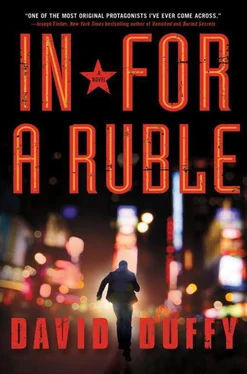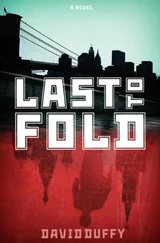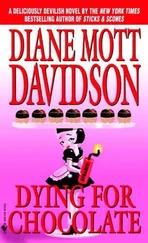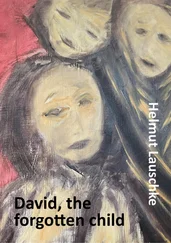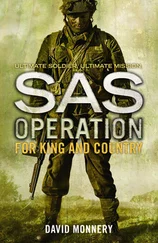“It was built in Detroit. You want to put down the top?”
“I may be crazy, but I’m not stupid. I’m also a warm-blooded girl—as you’ve been rediscovering.”
I took the FDR to Fifty-ninth Street and continued uptown on First Avenue. If Victoria guessed our destination, she didn’t say anything. I found a parking place on East Eighty-first.
“Giancarlo and I are on a first-name basis,” I said.
She smiled broadly, and we walked two blocks to Trastevere.
I held the door and followed her in. Giancarlo knocked two customers and a waiter sideways in his haste to get across the room.
“Signora, I…”
He was uncharacteristically confused by proper restaurateur-patron protocol, unsure whether to hug her, kiss her, or just shake hands. She solved the problem by putting her arms around him and kissing both cheeks. He looked at me over her shoulder as if to say, What did I tell you?
“It’s good to see you Giancarlo,” she said. “It’s good to be home. Turbo tells me he’s become a devotee of your cooking.”
“ Si, Signore Turbo, he comes all the time. But always alone, until tonight.” His voice dropped and he leaned forward, whispering, “And I don’t think he appreciates the wine.”
“He has a lot of holes in his education. We’re working on that.”
Giancarlo gave every indication of owning the world as he led us to a table. He fussed over getting Victoria seated and unfolding her napkin. She said she’d like a martini and I nodded in agreement. He came back with the drinks, recited the specials, and we chose the seafood salad and wild mushroom pasta we’d had the first time we were there together.
When the salads came, Giancarlo appeared with a bottle that he held out to Victoria, label up. “A ’ninety-seven Brunello, the Montosoli from Altesino. My gift. Welcome home.”
“Thank you, Giancarlo. That’s very kind. Turbo thanks you too. In fact, I think I can hear him sighing with relief.”
Giancarlo looked at her, beaming, then at me. “To tell you the truth, signora, so can I.”
* * *
“Just out of curiosity, how much was the wine, do you think?” I asked as we drove downtown.
“On his list? Probably five hundred, maybe six.”
It had been completely different from that first Barolo. Different grape, different region, different climate and soil, Victoria said. But it shared a complexity of flavor and structure that was surely intriguing—but not $500 intriguing.
“Another bottle I won’t be having again,” I said.
“Don’t be a cheapskate. I’m not a cheap date.”
“Five hundred dollars is more than most Soviet collective farms produced in a year.”
“And where is the Soviet economy now?”
We put the Potemkin in the garage and walked through the chilly streets to my apartment.
“That was a lovely evening, thank you,” she said, taking my hand in hers.
We made love slowly and luxuriously.
“Mmmmm. It doesn’t get any better than this,” she said before she fell asleep.
It does get worse. And it would, starting the next morning.
Victoria declined my invitation to run with a sleepy, “Are you fucking crazy?”
I did five miles and returned at seven to find her still in bed.
“You’re going to have trouble transitioning back to working hours.”
“Lawyers start late.”
“As I remember, you used to go around the clock.”
“That was before my virtuous American work ethic was undermined by the socialist Evil Empire.”
We ate eggs and toast and coffee and she said she had to visit the office before going uptown and reclaiming her apartment from the dust covers, the first step toward reentering her normal life. I felt a tug at that. She felt it too, and squeezed my hand. “It’s only uptown, you dope. Closer to Trastevere.”
“That’s what I’m afraid of.”
That put an end to the squeeze, and she went to get dressed.
* * *
Victoria went to her office and I went to mine. Foos was elsewhere, Pig Pen was absorbed in the morning rush hour, and I spent an hour sipping coffee while I thought about the Leitzes, my newfound liberty and good fortune, and why I didn’t feel better about the state of the world than I did. Victoria was back—and gave every indication of intending to stay. The winter of discontent hanging over the House of Turbo had morphed unannounced into spring. I was a million dollars ahead, and didn’t have to pay estimated income tax until April. One price of my adopted county. I owned a Repin self-portrait and could look forward to the unrestricted enjoyment of a painting most museums would kill for. How many people hit that kind of trifecta? I still had Beria to deal with, and no good idea of how, but he was just a ghost at this point, despite his periodic appearances, or so I tried to tell myself, a long-dead madman whose madness had died when he did, with no ability to inflict pain or suffering or death any longer—or so I tried to tell myself. I couldn’t quite get myself to believe it.
At the moment, however, present tugged harder than past. I was finished with the Leitzes, but I didn’t feel done. Too many open questions. What did Thomas Leitz have on his brother-in-law? Why did everyone in the family, except maybe Jenny, get nervous when Coryell’s name came up? How did he get tied up with Nosferatu and the BEC? Where was he spending his time, leaving no trail for the Basilisk? And where did seventeen-year-old Andras get $11 million—$22 million, if I added in Irina’s take?
If I pushed it, what was really roiling me was what Thomas Leitz said about sweeping things under the rug. The Leitz family made a lifetime habit of it, but didn’t I as well? My Gulag past. My fear over Beria. Things had happened to them—I had no idea what—that they didn’t want to confront. Was I any different? I’d been running from my upbringing all my life. Now I was running from my prospective parentage. Maybe the fires of Leitz burned a little too close to Turbo’s home. Leaving theirs untended left me only my own to contemplate.
Confusion, one step ahead of dejection, was overtaking satisfaction when the phone rang.
“This is Pauline Turner,” a woman’s voice said. “I’m sorry I didn’t get back to you sooner. I’ve been away and just got your message.”
Half a beat before it clicked—Turner, Mrs. Leitz the first.
“Thank you for returning my call, but the matter I called about… It’s been taken care of.”
“Oh.” Pause. “Is everyone all right? Your message said Sebastian…”
“Everyone’s fine,” I said, although I wasn’t sure that was true. “It concerned your husband’s office, we figured out what the problem was.”
“Then Andras wasn’t involved?”
“No.” I wasn’t sure that was true either. “Why do you ask?”
Another pause. “Just making sure. Mother’s protective instinct, I suppose.”
That sounded good, but I didn’t believe it. I should have said good-bye and hung up.
“Tell me one thing,” I said. “Your son—what’s his relationship with his uncle Walter?”
A long silence. When she spoke, her voice was quiet and scared.
“Why did you ask that question?”
“There appears to be some tension between them. I was curious about the cause.”
“When… They’re not supposed… When did you see them together?”
She pressed the question like an accusation. I backed off and tried to reassure her.
“I haven’t. I haven’t met either one, to be honest. It’s more what others have told me.”
“Who told you? What did they say?”
Читать дальше
